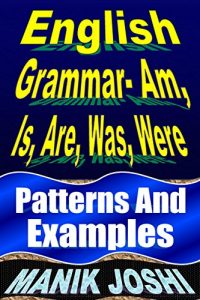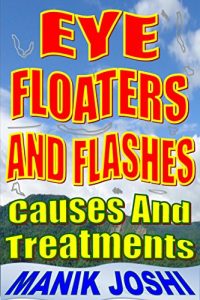This Book Covers The Following Topics:
Verb 'To Be'
Verb 'To Be' -- Negative Patterns
Verb 'To Be' -- Interrogative Patterns
1A. English Grammar - 'Am'
1B. AM + -ING Form of Verb
1C. AM + Being + Past Participle
1D. AM + Past Participle
2A. English Grammar - 'Is'
2B. IS + -ING Form of Verb
2C. IS + Being + Past Participle
2D. IS + Past Participle
3A. English Grammar - 'Are'
3B. ARE + -ING Form of Verb
3C. ARE + Being + Past Participle
3D. ARE + Past Participle
4A. English Grammar - 'Was'
4B. WAS + -ING Form of Verb
4C. WAS + Being + Past Participle
4D. WAS + Past Participle
5A. English Grammar - 'Were'
5B. WERE + -ING Form of Verb
5C. WERE + Being + Past Participle
5D. WERE + Past Participle
Exercises: 1(A) and 1(B)
Exercises: 2(A) to 2(E)
Sample This:
Verb 'To Be'
The Verb 'to be' is used to represent the following English verbs:
'Am', 'Is', 'Are', 'Was', 'Were'
The verb 'to be' is used as both linking verb and auxiliary verb.
LINKING VERB:
A verb that connects a subject with the complement (adjective or noun) that describes it.
Example: He is an engineer. [In this sentence, subject (he) and noun (engineer) is connected by linking verb 'is'. There is no main verb inthis sentence.]
Some more examples:
I am happy. [linking verb - am]
Is he good boy? [linking verb - is]
We are very proud of ourselves. [linking verb - are]
She was intelligent. [linking verb - was]
They were not late by half an hour. [linking verb - were]
AUXILIARY VERB:
A verb which is used with main verb to show tenses, etc.
Example: He is going to office. [In this sentence, -ing form of main verb 'go' has been used with auxiliary verb 'is'.
Some more examples:
I am studying a book. [auxiliary verb - am | main verb - study (-ing form)]
He is working on his project [auxiliary verb - is | main verb - work (-ing form)]
We are not expected to tell the secret. [auxiliary verb - are | main verb - expect (past participle form)]
She was taught by me. [auxiliary verb - was | main verb - teach (past participle form)]
Were they burdened by high taxation [auxiliary verb - were | main verb - burden (past participle form)]
IMPORTANT POINTS ABOUT VERB 'TO BE'
'AM' -
Singular Verb
Used In Present Tense
Used with Subject 'I'
'IS' -
Singular Verb
Used In Present Tense
Used with Subject 'He' 'She', 'It' and other Singular Subjects
'ARE' -
Plural Verb
Used In Present Tense
Used with Subject 'We', 'You', 'They' and other Plural Subjects
'WAS' -
Singular Verb
Used In Past Tense
Used with Subject 'I', 'He', She', 'It' and other Singular Subjects
'WERE' -
Plural Verb
Used In Past Tense
Used with Subject 'We', 'You' and other Plural Subjects
Verb 'To Be'
Verb 'To Be' -- Negative Patterns
Verb 'To Be' -- Interrogative Patterns
1A. English Grammar - 'Am'
1B. AM + -ING Form of Verb
1C. AM + Being + Past Participle
1D. AM + Past Participle
2A. English Grammar - 'Is'
2B. IS + -ING Form of Verb
2C. IS + Being + Past Participle
2D. IS + Past Participle
3A. English Grammar - 'Are'
3B. ARE + -ING Form of Verb
3C. ARE + Being + Past Participle
3D. ARE + Past Participle
4A. English Grammar - 'Was'
4B. WAS + -ING Form of Verb
4C. WAS + Being + Past Participle
4D. WAS + Past Participle
5A. English Grammar - 'Were'
5B. WERE + -ING Form of Verb
5C. WERE + Being + Past Participle
5D. WERE + Past Participle
Exercises: 1(A) and 1(B)
Exercises: 2(A) to 2(E)
Sample This:
Verb 'To Be'
The Verb 'to be' is used to represent the following English verbs:
'Am', 'Is', 'Are', 'Was', 'Were'
The verb 'to be' is used as both linking verb and auxiliary verb.
LINKING VERB:
A verb that connects a subject with the complement (adjective or noun) that describes it.
Example: He is an engineer. [In this sentence, subject (he) and noun (engineer) is connected by linking verb 'is'. There is no main verb inthis sentence.]
Some more examples:
I am happy. [linking verb - am]
Is he good boy? [linking verb - is]
We are very proud of ourselves. [linking verb - are]
She was intelligent. [linking verb - was]
They were not late by half an hour. [linking verb - were]
AUXILIARY VERB:
A verb which is used with main verb to show tenses, etc.
Example: He is going to office. [In this sentence, -ing form of main verb 'go' has been used with auxiliary verb 'is'.
Some more examples:
I am studying a book. [auxiliary verb - am | main verb - study (-ing form)]
He is working on his project [auxiliary verb - is | main verb - work (-ing form)]
We are not expected to tell the secret. [auxiliary verb - are | main verb - expect (past participle form)]
She was taught by me. [auxiliary verb - was | main verb - teach (past participle form)]
Were they burdened by high taxation [auxiliary verb - were | main verb - burden (past participle form)]
IMPORTANT POINTS ABOUT VERB 'TO BE'
'AM' -
Singular Verb
Used In Present Tense
Used with Subject 'I'
'IS' -
Singular Verb
Used In Present Tense
Used with Subject 'He' 'She', 'It' and other Singular Subjects
'ARE' -
Plural Verb
Used In Present Tense
Used with Subject 'We', 'You', 'They' and other Plural Subjects
'WAS' -
Singular Verb
Used In Past Tense
Used with Subject 'I', 'He', She', 'It' and other Singular Subjects
'WERE' -
Plural Verb
Used In Past Tense
Used with Subject 'We', 'You' and other Plural Subjects












